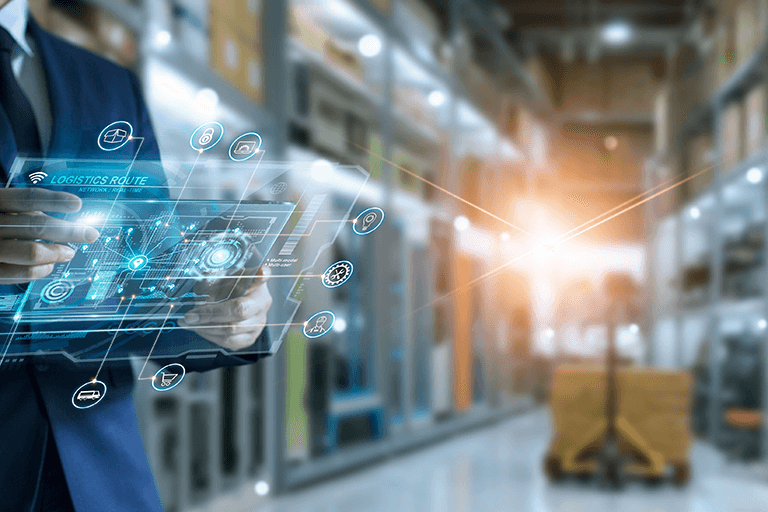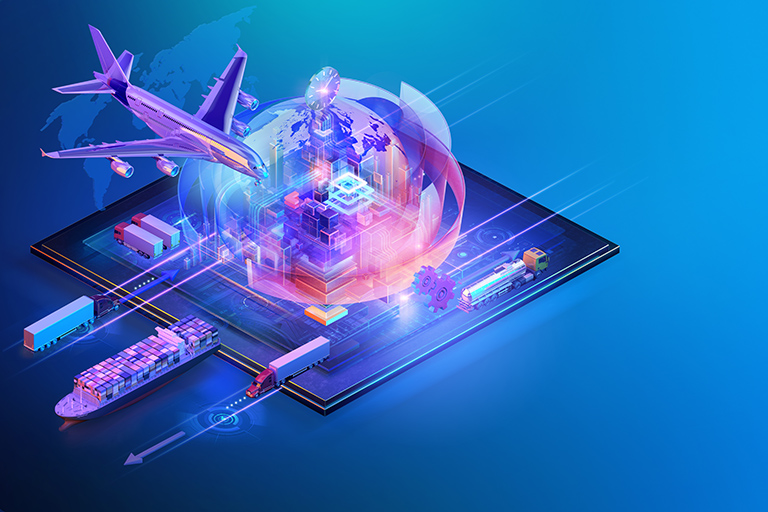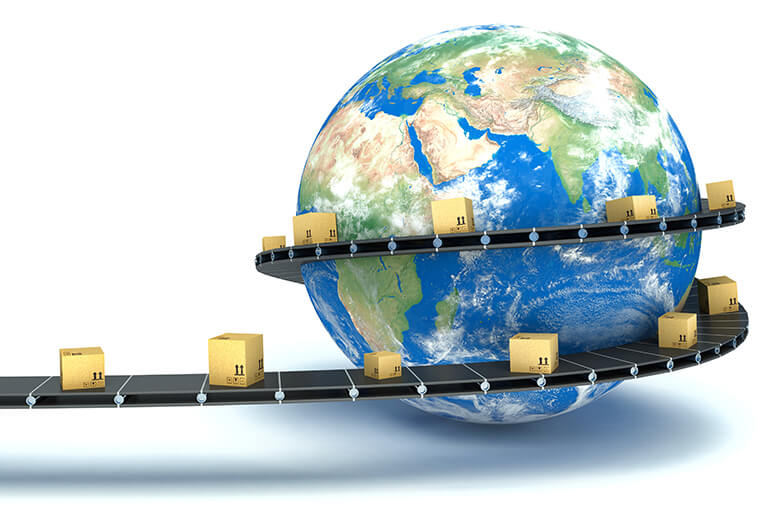How New Technologies Deliver Smarter Supply Chains
Emergent technologies like artificial intelligence are helping to make supply chains smarter, more resilient and agile. We dive deeper into their potential for FedEx as well as Asia SMEs.
Why do small business owners, importers and exporters place so much value on their supply chain? For SMEs and e-commerce businesses especially, there are huge benefits in upgrading supply chains. Logistics keeps businesses moving, and the more sophisticated the supply network, the greater opportunities for success.
One study found a 20% reduction in forecast errors with intelligent supply chains, while another reports a 25% reduction in order-to-delivery lead times.
Powered by artificial intelligence (AI) and machine learning (ML) technologies, intelligent supply chains enable businesses of all sizes to optimize operations and expand their footprint more easily. They’re also able to achieve new levels of efficiency, agility, and competitiveness.
At FedEx, technology and innovation are ingrained in our operations as we evolve to meet market demands. Harnessing the potential of digital transformation can create smarter supply chains for everyone. Read on to find out how we’re shaping enhanced supply chain networks for the region’s businesses.
The supply chain and logistics industry are being transformed by digitalization. One key trend we’re seeing is the adoption of connected logistics for more efficient and timely shipment management.
One study found a 20% reduction in forecast errors with intelligent supply chains, while another reports a 25% reduction in order-to-delivery lead times.
Powered by artificial intelligence (AI) and machine learning (ML) technologies, intelligent supply chains enable businesses of all sizes to optimize operations and expand their footprint more easily. They’re also able to achieve new levels of efficiency, agility, and competitiveness.
At FedEx, technology and innovation are ingrained in our operations as we evolve to meet market demands. Harnessing the potential of digital transformation can create smarter supply chains for everyone. Read on to find out how we’re shaping enhanced supply chain networks for the region’s businesses.
The latest trends we’re seeing in the supply chain – and how we’re helping small businesses leverage them
The supply chain and logistics industry are being transformed by digitalization. One key trend we’re seeing is the adoption of connected logistics for more efficient and timely shipment management.

Our analytics center in Singapore works closely with FedEx Dataworks to steer the company’s digital transformation in Asia and beyond. Mapping and using delivery data helps optimize internal operations. The teams use machine learning, artificial intelligence (AI), and advanced analytics programs to improve complex processes, prevent problems or make decision recommendations in real-time.
By teaming up with Microsoft, we're putting data to work through our digital and physical networks. Being data-driven provides unparalleled visibility and control over the movement of goods globally. And it all leads to faster and more efficient deliveries.
Thanks to ever greater amounts of connected, continuous, and contextual data, we are transforming the way we operate. Most importantly, we can deliver more intelligent supply chains for our customers.
FedEx pioneered the express distribution business – an industry built on speed and efficiency. And we created a massive digital supply chain network to ship physical objects across the world efficiently. Today, technological innovations and digitalization have enabled us to build, expand, and simplify our physical network for moving goods around the globe.
For example, SMEs can now reach more customers and international markets with ease. FedEx digital solutions such as FedEx Ship Manager and Electronic Trade Documents automate and simplify delivery customs clearance procedures. They also help customers navigate the global marketplace and take advantage of the new opportunities presented by digitalization.
One outcome of the pandemic is that the surge in online shopping meant consumer delivery expectations grew increasingly specific. Shoppers demanded more ease, simplicity, and convenience than ever before. E-commerce delivery solutions like FedEx Delivery Manager International (FDMi) help recipients customize package delivery to fit around their busy schedules, enhancing the last-mile delivery experience.
FedEx also integrated WhatsApp, one of the most popular instant messaging apps, into FDMi, providing consumers with peace of mind through the traceability of their package on their mobile devices.
And recent solutions like picture proof of delivery give consumers shopping online the assurance that their package has been delivered to their door.
By teaming up with Microsoft, we're putting data to work through our digital and physical networks. Being data-driven provides unparalleled visibility and control over the movement of goods globally. And it all leads to faster and more efficient deliveries.
Thanks to ever greater amounts of connected, continuous, and contextual data, we are transforming the way we operate. Most importantly, we can deliver more intelligent supply chains for our customers.
Digitalization allows us to offer a more powerful customer experience
FedEx pioneered the express distribution business – an industry built on speed and efficiency. And we created a massive digital supply chain network to ship physical objects across the world efficiently. Today, technological innovations and digitalization have enabled us to build, expand, and simplify our physical network for moving goods around the globe.
For example, SMEs can now reach more customers and international markets with ease. FedEx digital solutions such as FedEx Ship Manager and Electronic Trade Documents automate and simplify delivery customs clearance procedures. They also help customers navigate the global marketplace and take advantage of the new opportunities presented by digitalization.
One outcome of the pandemic is that the surge in online shopping meant consumer delivery expectations grew increasingly specific. Shoppers demanded more ease, simplicity, and convenience than ever before. E-commerce delivery solutions like FedEx Delivery Manager International (FDMi) help recipients customize package delivery to fit around their busy schedules, enhancing the last-mile delivery experience.
FedEx also integrated WhatsApp, one of the most popular instant messaging apps, into FDMi, providing consumers with peace of mind through the traceability of their package on their mobile devices.
And recent solutions like picture proof of delivery give consumers shopping online the assurance that their package has been delivered to their door.

AI is helping deliver smarter supply chains
In logistics, AI is fast opening up new possibilities for process efficiency and customer convenience. At the current rate of AI development, we in the industry will soon see customers placing shipment orders with simple verbal instructions via digital personal assistants.
We’re responding to changing consumer lifestyles and needs, too. Solutions such as FDMi empower end customers to manage their packages from their mobiles, scheduling deliveries and choosing from several delivery options at their convenience.
RELATED: How GenAI can help your small business
How technology can improve mobility, automation, and sustainability
So much tech - from Internet of Things (IoT), AI, and autonomous tech to advanced robotics – is already integrated into our daily lives.
We’re taking advantage of AI and automation in our regional facilities. Our upcoming regional air and ground hub at Dubai South’s Logistics District will include an automated and advanced sorting system, high-speed security screening equipment, cold-chain services, and capabilities to manage dangerous goods.
Like any other industry, we lean on advanced technologies to support sustainability and operational efficiency. For example, we recently concluded the electric vehicle (EV) trials in the UAE, following many other EV roll-outs across Asia Pacific, the Middle East and Africa. Once these EVs are deployed as part of our fleet, they will contribute to reducing our carbon emissions.
RELATED: How we’re charged up about electric vehicles

But logistics still needs to overcome challenges to tap greater potential for SMEs
The logistics industry is currently grappling with several challenges. These include labor shortages, supply chain delays stemming from unprecedented global demand and disruption, and changes to the regulatory frameworks that govern cross-border trade.
This is all playing out despite the needs of SMEs and e-commerce businesses for faster, more transparent deliveries. However, at FedEx, we view these challenges as opportunities. The solution is to combine innovation, customer satisfaction and continuous improvement with a strategic, data-driven approach. That way, we can address these issues head-on and keep up our high standards of service in what has become a very complex environment.
Future-proofing our business to support the SMEs of tomorrow
At FedEx, we like to say that we operate in the space ‘where now meets next’. As we continue to deliver today, we’re looking ahead to see where the world might need us tomorrow. By streamlining our cost structure, we can also benefit our customers in the long run.
Finally, tech innovation is part of our DNA, driving us to transform and adapt to this digitally changing world. All businesses need to become more resilient in a dynamically shifting landscape, and more adaptable to market demands. This includes offering a differentiated portfolio, enabling smarter supply chains, cutting costs without sacrificing customer experience, and building on what already works well.
For more insights on the technology we’re putting to work for intelligent supply chains, head to our Innovation hub here.
***
A version of this article first appeared in Gulf Business on August 6, 2023.



















 The Latest
The Latest